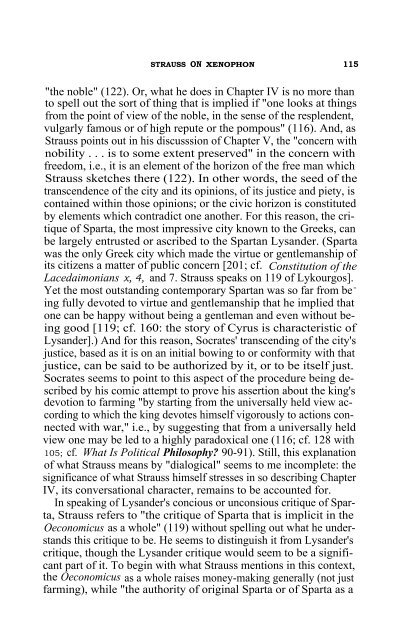Strauss on Xenophon's Socrates Xenophon's Socratic Discourse: An ...
Strauss on Xenophon's Socrates Xenophon's Socratic Discourse: An ...
Strauss on Xenophon's Socrates Xenophon's Socratic Discourse: An ...
Create successful ePaper yourself
Turn your PDF publications into a flip-book with our unique Google optimized e-Paper software.
STRAUSS ON XENOPHON 115<br />
"the noble" (122). Or, what he does in Chapter IV is no more than<br />
to spell out the sort of thing that is implied if "<strong>on</strong>e looks at things<br />
from the point of view of the noble, in the sense of the resplendent,<br />
vulgarly famous or of high repute or the pompous" (116). <strong>An</strong>d, as<br />
<str<strong>on</strong>g>Strauss</str<strong>on</strong>g> points out in his discusssi<strong>on</strong> of Chapter V, the "c<strong>on</strong>cern with<br />
nobility . . . is to some extent preserved" in the c<strong>on</strong>cern with<br />
freedom, i.e., it is an element of the horiz<strong>on</strong> of the free man which<br />
<str<strong>on</strong>g>Strauss</str<strong>on</strong>g> sketches there (122). In other words, the seed of the<br />
transcendence of the city and its opini<strong>on</strong>s, of its justice and piety, is<br />
c<strong>on</strong>tained within those opini<strong>on</strong>s; or the civic horiz<strong>on</strong> is c<strong>on</strong>stituted<br />
by elements which c<strong>on</strong>tradict <strong>on</strong>e another. For this reas<strong>on</strong>, the critique<br />
of Sparta, the most impressive city known to the Greeks, can<br />
be largely entrusted or ascribed to the Spartan Lysander. (Sparta<br />
was the <strong>on</strong>ly Greek city which made the virtue or gentlemanship of<br />
its citizens a matter of public c<strong>on</strong>cern [201; cf. C<strong>on</strong>stituti<strong>on</strong> of the<br />
Lacedaim<strong>on</strong>ians x, 4, and 7. <str<strong>on</strong>g>Strauss</str<strong>on</strong>g> speaks <strong>on</strong> 119 of Lykourgos].<br />
Yet the most outstanding c<strong>on</strong>temporary Spartan was so far from be -<br />
ing fully devoted to virtue and gentlemanship that he implied that<br />
<strong>on</strong>e can be happy without being a gentleman and even without being<br />
good [119; cf. 160: the story of Cyrus is characteristic of<br />
Lysander].) <strong>An</strong>d for this reas<strong>on</strong>, <strong>Socrates</strong>' transcending of the city's<br />
justice, based as it is <strong>on</strong> an initial bowing to or c<strong>on</strong>formity with that<br />
justice, can be said to be authorized by it, or to be itself just.<br />
<strong>Socrates</strong> seems to point to this aspect of the procedure being described<br />
by his comic attempt to prove his asserti<strong>on</strong> about the king's<br />
devoti<strong>on</strong> to farming "by starting from the universally held view according<br />
to which the king devotes himself vigorously to acti<strong>on</strong>s c<strong>on</strong>nected<br />
with war," i.e., by suggesting that from a universally held<br />
view <strong>on</strong>e may be led to a highly paradoxical <strong>on</strong>e (116; cf. 128 with<br />
105; cf. What Is Political Philosophy? 90-91). Still, this explanati<strong>on</strong><br />
of what <str<strong>on</strong>g>Strauss</str<strong>on</strong>g> means by "dialogical" seems to me incomplete: the<br />
significance of what <str<strong>on</strong>g>Strauss</str<strong>on</strong>g> himself stresses in so describing Chapter<br />
IV, its c<strong>on</strong>versati<strong>on</strong>al character, remains to be accounted for.<br />
In speaking of Lysander's c<strong>on</strong>cious or unc<strong>on</strong>sious critique of Sparta,<br />
<str<strong>on</strong>g>Strauss</str<strong>on</strong>g> refers to "the critique of Sparta that is implicit in the<br />
Oec<strong>on</strong>omicus as a whole" (119) without spelling out what he understands<br />
this critique to be. He seems to distinguish it from Lysander's<br />
critique, though the Lysander critique would seem to be a significant<br />
part of it. To begin with what <str<strong>on</strong>g>Strauss</str<strong>on</strong>g> menti<strong>on</strong>s in this c<strong>on</strong>text,<br />
the Oec<strong>on</strong>omicus as a whole raises m<strong>on</strong>ey-making generally (not just<br />
farming), while "the authority of original Sparta or of Sparta as a

















